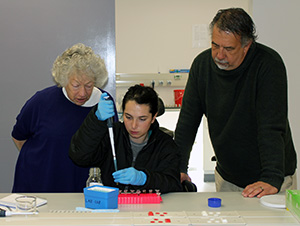Latest News Archive
Please select Category, Year, and then Month to display items
14 June 2024
|
Story Anthony Mthembu
|
Photo Suplied
 Jeremiah Hlahla, a UFS student completing his PhD in Botany at the University of Debrecen as part of an exchange initiative funded by the Erasmus+ Mobility Programme.
Jeremiah Hlahla, a UFS student completing his PhD in Botany at the University of Debrecen as part of an exchange initiative funded by the Erasmus+ Mobility Programme.
As part of an exchange initiative facilitated by the Erasmus+ Mobility Programme, Jeremiah Hlahla, a student at the University of the Free State (UFS), is nearing the completion of his PhD studies at the University of Debrecen in Hungary. Hlahla’s journey, which began in February 2024 and is set to conclude in July 2024, has been a remarkable learning opportunity. “As a first time-traveller to Europe, I have thoroughly enjoyed engaging with people from different countries and cultures,” he said.
The benefits of international collaboration
Hlahla is currently pursuing a PhD in Botany, focusing on plant stress physiology. “My current PhD project investigates the physiological, biochemical and morphological responses of vegetable-type soybean, or edamame, to combined drought and heat stress,’’ he explained. He considers the University of Debrecen the ideal institution to complete his research due to its extensive expertise and resources in similar projects. He noted that his colleagues at Debrecen conduct significant work on plant protection against biotic and abiotic stresses, including salt and drought stress, as well as proteins and amino acids in barley and other legumes.
Given the vast knowledge available on similar projects, Hlahla has found substantial engagement with his work at the University of Debrecen. “Upon arrival, I delivered an introductory lecture presenting my UFS project on the synergistic effects of combined drought and heat stress on the physiology and biochemistry of edamame. It was an engaging session as everyone could relate to my work and asked many questions,’’ he said.
Insights gained from the exchange
Hlahla has also gained valuable lessons that will assist him in his research career, including biotechnology and physiology tools. “I learned how to prepare samples and use high-performance liquid chromatography (HPLC) and reversed-phase ultra-high-performance liquid chromatography (UHPLC) to quantify proteins and amino acids,’’ he said. These techniques are beneficial not only for his current work but will also support future soybean research.
As his experience at the University of Debrecen nears its end, Hlahla reflects on the collaborations and friendships he has formed, which stand out as a significant highlight.
Monkey research attracts international attention
2016-07-11

Prof Trudy Turner from the University of
Wisconsin-Milwaukee and Prof Paul Grobler
from the Department of Genetics at the
University of the Free State, together with one
of the students researching monkey genes.
Photo: Siobhan Canavan
For this year’s Summer School programme, Prof Paul Grobler, from the University of the Free State Department of Genetics focuses on research about the conflict between monkeys and humans in areas where monkeys are regarded as problem animals.
Global expert part of research
This year, Prof Grobler is hosting a group of students and lecturers from the United States of America (USA). The group includes Prof Trudy Turner from the University of Wisconsin-Milwaukee (UWM), a global expert on vervet monkeys. She has been working with the Department of Genetics at the UFS for the past fifteen years, and has also been appointed as an Affiliated Professor in the department.
“The Summer School programme is an opportunity for the American Primatology students to gain practical experience in Africa,” says Prof Grobler.
International interest in Summer School
This year’s Summer School programme involves four lecturers and nine students. The lecturers are from the University of Wisconsin-Milwaukee (UWM), the University of California, Los Angeles (UCLA), Boston University, and Central Washington University.
“We use the genetic information to determine
how monkeys historically infiltrated the
different areas in South Africa.”
This year’s focus is on the genetic structure of the monkeys in South Africa, and research that is being done on the differences and similarities in monkeys from different areas. “We use the genetic information to determine how monkeys historically infiltrated the different areas in South Africa,” says Prof Grobler.
Local nature reserve acting as host
The group will perform field work, including observing monkeys in the Soetdoring Nature Reserve, as well as laboratory work in the department, where they will be assisted by two laboratory technicians.
Two years ago, Prof Grobler and his department tested this idea on a smaller scale, and now they hope to make this a regular event.